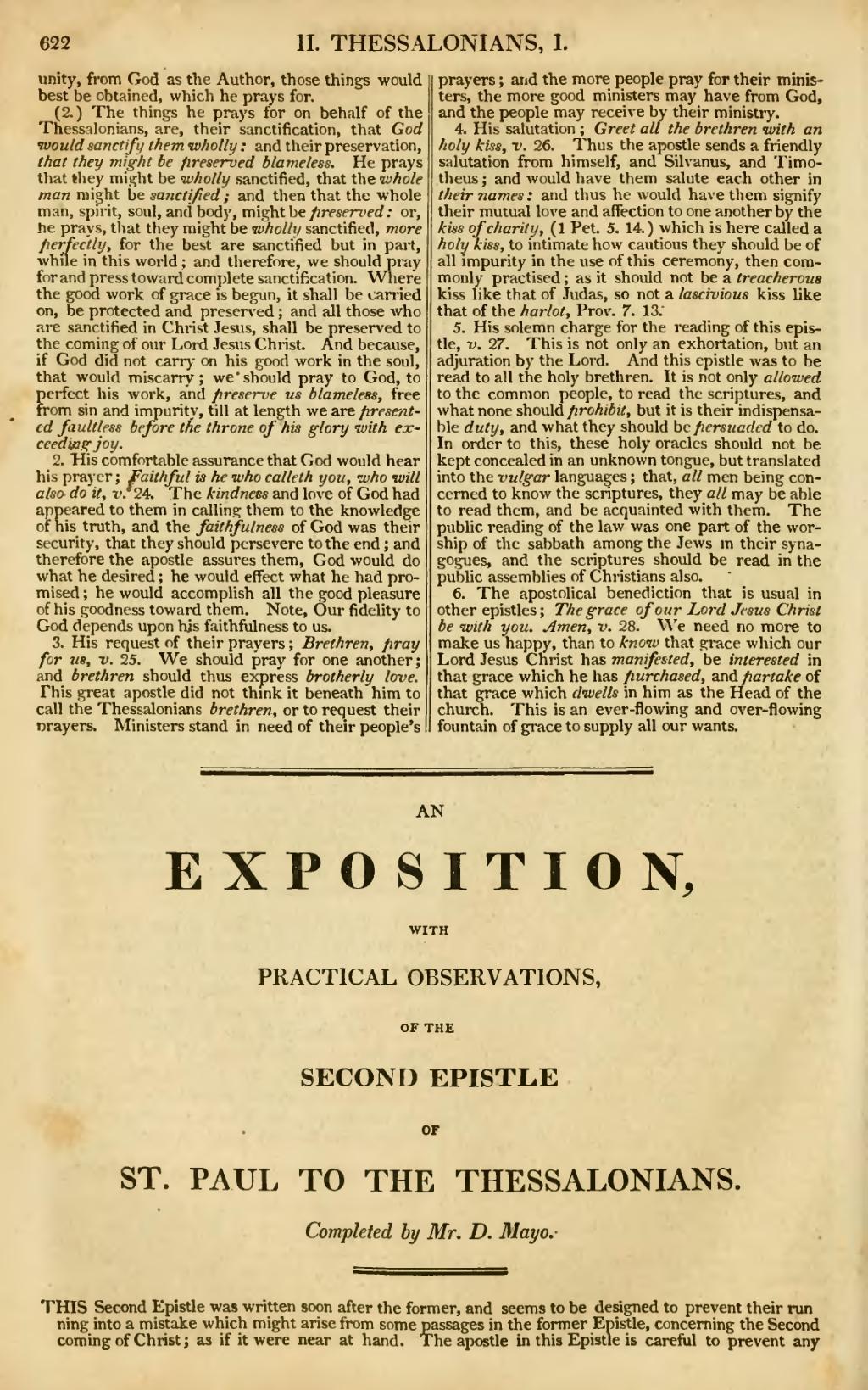unity, from God as the Author, those things would best be obtained, which he prays for. (2.) The things he prays for on behalf of the Thessalonians, are, their sanctification, that God would sanctify them wholly : and their preservation, that they might he fireserved blameless. He prays that they might be wholly sanctified, that the whole man might be sanctijied ; and then that the whole man, spirit, soul, and body, might he firese7~ved : or, he prays, that they might be wholly sanctified, moi-e perfectly, for the best are sanctified but in part, while in this world ; and therefore, we should pray for and press toward complete sanctification. Where the good work of grace is begun, it shall be carried on, be protected and preserved ; and all those who are sanctified in Christ Jesus, shall be preserved to the coming of our Lord Jesus Christ. And because, if God did not carr}* on his good work in the soul, that would miscarry; we" should pray to God, to perfect his work, and preserve us blameless, free from sin and impurity, till at length we ave present- ed faultless before the throne of his glory with ex- ceediffgjoy. . His comfortable assurance that God would hear his prayer; Faithful is he who calleth you, who will also^ do it, V. 24. The /cindness and love of God had appeared to them in calling them to the knowledge of his truth, and the faithfulness of God was their security, that they should persevere to the end ; and therefore the apostle assures them, God would do what he desired ; he would effect what he had pro- mised ; he would accomplish all the good pleasure of his goodness toward them. Note, Our fidelity to God depends upon his faithfulness to us. . His request of their prayers ; Brethren, pray for us, V. 25. We should pray for one another; and brethren should thus express brotherly love. This great apostle did not thuik it beneath him to call the Thessalonians brethren, or to request their nrayers. Ministers stand in need of their people's prayers ; and the more people pray for their minis- ters, the more good ministers may have from God, and the people may receive by their ministry. . His salutation ; Greet all the brethren with an holy kiss, v. 26. Thus the apostle sends a friendly salutation from himself, and Silvanus, and Timo- theus ; and would have them salute each other in their 7iames : and thus he would have them signify their mutual love and affection to one another by the kiss of charity, (1 Pet. 5. 14.) which is here called a holy kiss, to intimate how cautious they should be of all impurity in the use of this ceremony, then com- monly practised ; as it should not be a treacherous kiss like that of Judas, so not a lascivious kiss like that of the harlot, Prov. 7. 13.' . His solemn charge for the reading of this epis- tle, V. 27. This is not only an exhortation, but an adjuration by the Lord. And this epistle was to be read to all the holy brethren. It is not only allowed to the common people, to read the scriptures, and what none should prohibit, but it is their indispensa- ble duty, and what they should he persuaded to do. In order to this, these holy oracles should not be kept concealed in an unknown tongue, but translated into the vulgar languages ; that, all men being con- cerned to knov/ the scriptures, they all may be able to read them, and be acquainted with them. The public reading of the law was one part of the wor- ship of the sabbath among the Jews m their syna- gogues, and the scriptures should be read in the public assemblies of Christians also. . The apostolical benediction that is usual in other epistles ; The grace of our Lord Jesus Christ be with you. Amen, v. 28. W'e need no more to make us happy, than to knonv that grace which our Lord Jesus Christ has manifested, be interested in that grace which he has purchased, and partake of that grace which dwells in him as the Head of the church. This is an ever -flowing and over-flowing fountain of gi-ace to supply all our wants.
AN
EXPOSITION,
WITH
PRACTICAL OBSERVATIONS,
OF THE
SECOND EPISTLE
OF
ST. PAUL TO THE THESSALONIANS.
Completed by Mr. D. Mayo.
THIS Second Epistle was written soon after the former, and seems to be designed to prevent their run
ning into a mistake which might arise from some passages in the former Epistle, concerning the Second
coming of Christ; as if it were near at hand. The apostle in this Epistle is careful to prevent any
